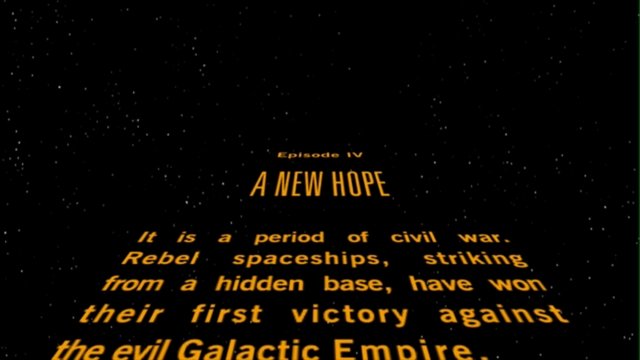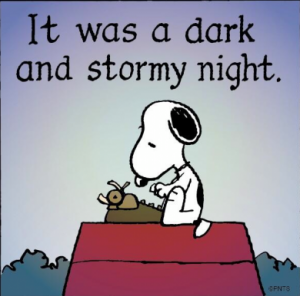Writing Good Intros: Don’t!
 The most exposition any film ever needs- but this film was so well crafted that even if this crawl had been left out, you could’ve easily followed the plot.
The most exposition any film ever needs- but this film was so well crafted that even if this crawl had been left out, you could’ve easily followed the plot.
Think of your favorite movie. Play out the opening scene in your head. You can see it now: there’s the protagonist, crossing the room to sit down on a chair in the center of the set. She/He faces you, then spends the next forty minutes explaining who s/he is, what her/his world is like, who the other major characters are, what their lives have been like, and where they all currently stand. Once that’s done, s/he jumps up again. “Great, now you’re up to speed. Let the story begin!”
Wait a minute. What the hell movie ever starts like this? Screenwriters never do this- so why do novelists instinctively gravitate toward info-dumps in Chapter One?
Introductions are brutal pains in the ass. Regardless of genre, fiction writers have to forge a balance between “Basil Exposition” (Austin Powers) and “Well, I guess the plot is none of our business” (Mystery Science Theater 3000). It’s even worse for those who write in settings other than present-day Earth. We fear throwing out too much technobabble too fast. “Why don’t you reconst your flavo-fibes?!” (again, MST3K)
Many of us overcompensate. Unlike a screenwriter, a book-writer has all the time and paper in the world- or so we imagine. We must take time to explain the universe a little before throwing story at them.
It doesn’t work. Every time I’ve tried this approach, it failed to impress the poor beta readers I foisted it upon. Those names, locations, and past events mean nothing when presented as information disconnected from any actual story. My beta readers had no context by which to start caring about it, so they didn’t. It came off as a pile of self-indulgent crap I was making them slog through. Many readers would flip several pages into my manuscript, to the point where characters appeared and were doing stuff, and would tell me, “Start here.”
In other words: having trouble writing an intro? No problem! Don’t write an intro.
 No. Not unless you’re Madeline L’Engle.
No. Not unless you’re Madeline L’Engle.
A reader’s time is precious. He’s got zillions of books to choose from, and here he’s selected yours. Reward him with something that immediately reads like a story, not a lecture he’ll be quizzed on later.
Where should you start? The conventional advice is “as close to the end as possible.” I say that you should also introduce your main character(s) as quickly as possible, especially in a sci-fi/fantasy setting. The audience needs someone who’ll help them navigate and understand this strange new world. Going back to Star Wars: why didn’t the movie start with the Rebels stealing the plans? That could’ve been a great action sequence, but it also would’ve pushed back the introduction to Luke Skywalker. If we don’t meet him until an hour into the thing, can we really call him our hero? This approach probably would’ve made Leia our main character- and once the switch to Tattooine occurred, we would’ve thought, Hey, where’d my space movie go? Who the hell is this whiny jerk?
Once you have a good starting point, skip the exposition and launch right in, as if this were Chapter Five rather than Chapter One. Let each sentence construct the universe in real-time. If you have a lot of world-building to do, ease us in; don’t throw out too many unfamiliar terms at once. Teach us about the characters through their words and actions, but don’t succumb to the temptation of having characters speak exposition to each other (“You know, Bob, now that I’m a level twelve conjurer, my home town of Tridiot is really proud of me! Have you noticed how brown my eyes are? I just adore cake.”).
A little mystery is good, valuable even. If you don’t explain anything, that’s frustrating, but little questions- Why’s he so angry? Why’s this computer so important? -are like burs that attach your story to your reader’s mind, motivating him to keep reading for answers.
Is this advice universal? Nope. Are there beloved classics that start with acres of backstory? Absolutely, but most of them come from the pre-Internet days. When deciding how to approach your intro, consider who your reader is. Is he pulling your heavy leather-bound tome off his library shelf and curling up by the fire for a few hours of reading before bed? Is he buying your ebook and skimming it in the fleeting moments life affords him? Write however you like, but keep in mind what might compel your reader to stick with you or turn away.
Do you agree with my approach, disagree, or have further advice that could save writers’ hair from being violently ripped out at the roots? Please feel free to share in the comments!
2 thoughts on “Writing Good Intros: Don’t!”
I think that is solid advice. Many of the good writing books I have read agree with you. It just makes sense to me. Readers just want to be into a good story as soon as possible. We have time to ease the details in along the way.
Great post. Enjoyed it.
Thanks, Brent! Glad to hear it! :)